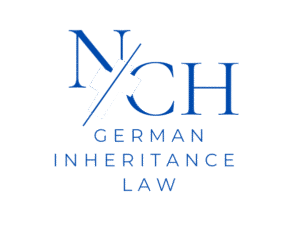Compulsory Share in German Inheritance Law – What Heirs and Testators Need to Know
Disinherited? Don’t assume you’re out. Under German inheritance law, even those cut out of a will may still be entitled to a significant portion of the estate—in cash. This legal right, known as the compulsory share (Pflichtteil), catches many U.S.-based heirs and testators by surprise and can complicate even the most carefully planned estates.
The Pflichtteil – Your Guaranteed Minimum Inheritance
Even if you’ve been left out of a will, German law may entitle you to a compulsory share of the estate. This is a cash claim worth at least half of your legal share—often including property, bank accounts, and gifts given in the last ten years.
Why claim it? Because it’s your legal right, it can be worth significant value, and it expires if you wait too long.
Why check eligibility? Cross-border cases are complex, and you might qualify even if the deceased lived abroad or held assets in another country. A quick review can reveal rights you didn’t know you had.
- Disinherited in Germany?
- What Is the Compulsory Share (Pflichtteil)?
- Who Is Entitled to the Compulsory Share (Pflichtteil)?
- How Much Is the Pflichtteil?
- Typical Pflichtteil Situations
- Pflichtteil Supplement Claims (Pflichtteilsergänzungsanspruch)
- Asserting the Pflichtteil
- Limiting Heir Liability
- Can the Pflichtteil Be Avoided?
- Cross-Border Complications: U.S. Implications
- Strategic Guidance for Testators
- Planning Mistakes to Avoid
- Frequently Asked Questions (FAQs)
- Top 5 Tipps
- Conclusion
Under German inheritance law, certain close relatives—regardless of what a will says—are entitled to a compulsory portion of the estate. This Pflichtteil serves as a legal safeguard against complete disinheritance. It is a monetary claim only, meaning the claimant receives a calculated portion of the estate’s value, not specific assets like real estate or heirlooms.
The rationale behind the Pflichtteil is to protect family cohesion and provide a minimum financial security net for close relatives. As such, children, spouses, and in some cases parents (when no descendants exist), cannot be fully excluded from the estate without consequences
The group of eligible claimants is narrowly defined:
- Children and grandchildren of the deceased
- Surviving spouses
- Parents (only when the deceased had no descendants)
- Grandchildren only qualify if their parent—a child of the deceased—has died before the decedent.
How Much Is the Pflichtteil?
The Pflichtteil amounts to half of the statutory share an heir would receive if no will existed. For instance, if a child would be entitled to 1/2 of the estate under intestate succession, their Pflichtteil is 1/4.
Example: If an estate is valued at €400,000 and the disinherited child would normally receive half, their Pflichtteil claim is €100,000.
The estate’s total value includes real estate, bank balances, securities, and certain gifts made within the ten years before death. Precise valuation, asset tracing, and timing are crucial.
Step 1
Step 2
Get a Legal Roadmap
Step 3
We Handle Everything
Typical Pflichtteil Situations
- A spouse is left out in favor of children from a previous marriage
- An estranged child receives nothing in the will
- A testator leaves everything to one heir and excludes others
- Unequal distribution triggers claims from partially disinherited relatives
Pflichtteil Supplement Claims (Pflichtteilsergänzungsanspruch)
If the deceased made significant lifetime gifts within the last ten years, these can be added back to the estate for Pflichtteil calculation. The closer to the time of death the gift was made, the greater its impact. This prevents intentional estate depletion to sidestep Pflichtteil obligations.
Asserting the Pflichtteil
Claimants must actively demand their share—it is not automatic. The process includes:
- Requesting a full inventory of estate assets and liabilities
- Securing independent valuations (especially for real estate)
- Submitting a formal payment claim to the heir(s)
- Legal enforcement if payment is refused or delayed
Limiting Heir Liability
Heirs facing Pflichtteil claims can protect themselves through strategic estate administration:
- Invoke the three-month defense period to assess liability
- Accept the estate under benefit of inventory to cap exposure
- Apply for estate insolvency proceedings if debts exceed assets
Can the Pflichtteil Be Avoided?
Disinheritance alone does not suffice. The Pflichtteil remains enforceable unless specific legal steps are taken:
✅ Pflichtteilsverzicht (Waiver Agreements): These must be notarized in Germany and typically involve compensation.
✅ Lifetime Gifts: Strategic gifting may reduce the estate’s value, but clawback rules apply within a 10-year window.
⚠️ International Complexity: U.S.-based assets can be included depending on the governing law and estate structure.
Attempting to circumvent the Pflichtteil without proper legal planning can backfire—both in court and within families.
Cross-Border Complications: U.S. Implications
For U.S.-based testators or heirs, the Pflichtteil adds a significant layer of complexity. German inheritance law can apply even if the deceased was living in the United States, depending on nationality and whether a choice of law was made under the EU Succession Regulation. Claims for the compulsory share typically must be asserted before German probate courts, although this can be handled remotely through legal representation in Germany. Importantly, common U.S. estate planning tools—such as living trusts—do not override German compulsory share rights unless they are carefully coordinated with German law. Finally, U.S. courts generally do not recognize or enforce Pflichtteil claims, meaning that any strategy to secure or defend against such claims must be executed within the German legal system.
Strategic Guidance for Testators
If you intend to exclude a statutory heir, don’t rely on silence or surprise. Proper legal structuring and documentation are essential:
- Explain exclusions clearly—both in the will and in private documentation
- Use waivers strategically, especially while relationships are amicable
- Make lifetime gifts with awareness of clawback rules
- Coordinate U.S. and German estate planning documents to avoid conflicts
- Communicate intentions early to reduce emotional fallout and legal disputes
Planning Mistakes to Avoid
Many international testators either ignore the Pflichtteil altogether or rely too heavily on U.S.-centric estate tools, assuming they will suffice. But failing to align your testamentary documents across jurisdictions, underestimating the reach of German law, or delaying discussions with potential Pflichtteil heirs often leads to court battles and irreversible losses. A proactive, coordinated approach is the only way to safeguard your legacy and minimize exposure.
Frequently Asked Questions (FAQs)
Top 5 Tipps
- Act quickly – Pflichtteil claims expire after 3 years
- Request full disclosure – heirs can demand an inventory
- Negotiate waivers in advance – while relationships are still intact
- Plan gifts strategically – timing and documentation matter
- Align your cross-border estate plan – avoid contradictions between wills and trusts
Conclusion
The Pflichtteil is not a footnote. It’s a powerful legal mechanism with real financial stakes. For U.S.-based heirs and German-American families, it often determines whether an estate plan holds or unravels. Don’t navigate this alone.
German-Attorney Nicola Casper-Hoesl helps clients assert or protect Pflichtteil claims across borders—strategically, discreetly, and with legal precision.
Nicola is an exceptional attorney with extensive knowledge in German inheritance law. Navigating international legal matters can be frustrating and complex, but Nicola made the process smooth and stress-free. Her professionalism along with clear communication were invaluable throughout the entire ordeal.
If you are in need of a knowledgeable, reliable, and supportive lawyer for inheritance matters involving Germany, Nicola is the best choice! I highly recommend her.
Nicola helped our family recover a €250k inheritance stuck in German probate—without us ever leaving California. Her team handled everything in 8 months.
Provided expert legal guidance through a very complex inheritance situation involving German banks, courts, and tax authorities. Extremely detailed, diligent, and knowledgeable. I would not have been able to resolve all the legal issues without her help. Very highly recommended!
During a very challenging time both emotionally and logistically, I could always count on Nicola. She expertly guided me through the ins and outs of German inheritance law. It was a pleasure to work with her.
Nicola is very knowledgeable about German /International Law and listens to her clients’ needs during challenging times in their lives.
She is very kind , responsive and efficient in her email & phone conversations. I was delighted to work with her in solving my niece’s case.
I highly recommend Nicola if someone needs any law advice about Inheritance or German/International law cases.

